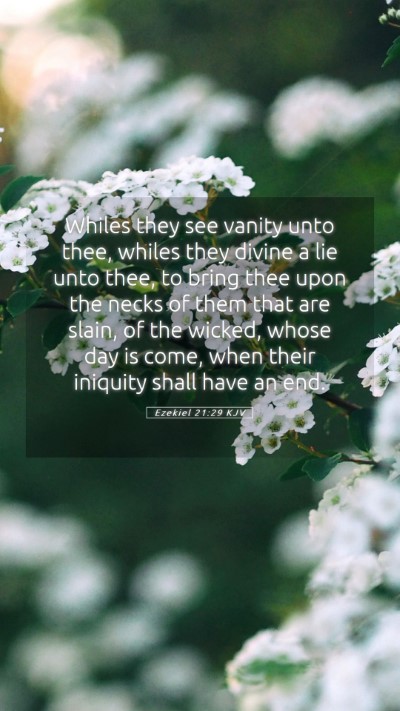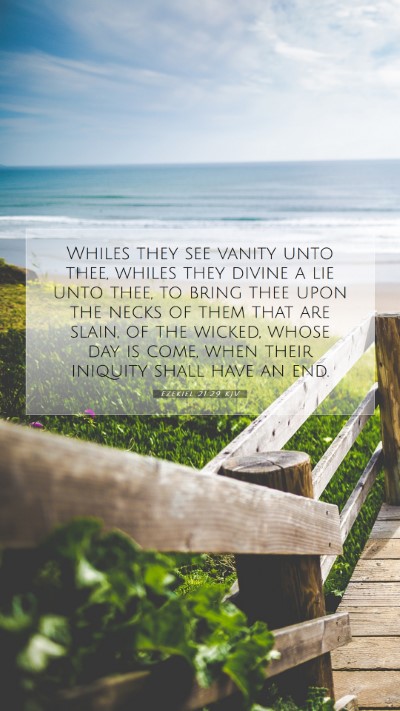Bible Verse Commentary: Ezekiel 21:29
Bible Verse: Ezekiel 21:29 - "While they see vanity unto you, it will be put to the sword, and they shall be in the presence of the sword, and they shall be in the face of the sword."
Understanding Ezekiel 21:29
This passage from Ezekiel conveys a powerful message about the judgment of God upon His people. The context involves the impending doom that awaits Jerusalem, where the false prophets have assured the people of peace, despite the reality of coming destruction. This echoing confusion of vanity speaks directly to the core of biblical prophecies and Israel’s spiritual state during Ezekiel's ministry.
Insights from Public Domain Commentaries
The interpretations of this verse can be gathered from several respected commentators:
- Matthew Henry: Henry emphasizes the contrast between the false assurances given by the prophets and the true impending judgment ordained by God. He notes that the vanity they see is deceptive and highlights the certainty that God’s Word will come to pass, contrasting hope with the grim reality.
- Albert Barnes: Barnes interprets the “sword” as a clear symbol of impending destruction, which signifies God’s judgment. He points out that this passage not only aims at the people of Jerusalem but also serves as a warning to modern readers about the repercussions of ignoring divine warnings.
- Adam Clarke: Clarke elaborates on the notion of “vanity,” indicating that the prophets have given a false view of what will occur, leading the populace to believe in safety when danger looms. He underscores the need for true prophetic insight to discern God’s will and stresses the importance of sincere repentance.
Biblical Exegesis and Analysis
In this verse, Ezekiel addresses the profound disconnect between God’s judgment and the people’s misunderstanding or denial of that judgment. The usage of metaphorical language, such as "vanity" and "sword," requires a deep understanding of Scripture to fully grasp its implications:
- Historical Context: The verse must be contextualized within a period when Israel faced calamity, underscoring the importance of heeding true prophetic voices over those who lead astray.
- Symbolism: The sword represents not only physical destruction but also a moral and spiritual failing that the nation had succumbed to, unbecoming of God's chosen people.
- Call for Repentance: This passage can be seen as a stark call for the people to turn away from their sinful ways and to re-establish their covenant with God, a theme that resonates throughout the prophets.
Application in Modern Life
Understanding Ezekiel 21:29 has significant implications for a contemporary audience:
- It encourages readers to look beyond attractive but false assurances and recognize the reality of spiritual consequences that may arise from disobedience to God.
- This verse serves as a reminder of the importance of discernment in one’s spiritual journey, particularly in distinguishing between true and false teachings.
- It prompts individuals to engage in deep self-reflection, ensuring alignment with God’s will through genuine repentance and faith.
Related Bible Cross References
- Jeremiah 23:16: A warning against listening to false prophets.
- Ezekiel 13:10-11: Discusses the dangers of those who prophesy from their own imaginations instead of God’s word.
- Isaiah 5:20: Addresses the corruption of moral truth, similar to the themes found in Ezekiel.
Conclusion: Significance and Reflection
In conclusion, Ezekiel 21:29 serves as a poignant reminder of the dire consequences of ignoring God's warnings. It encourages readers to pursue a deeper Bible verse understanding and embrace the true implications of divine communication. This passage, infused with rich spiritual meanings, invites modern-day believers to uphold the integrity of their faith amidst a world often filled with misleading information.
Incorporating this verse into personal Bible study lessons allows one to explore issues surrounding judgment, prophecy, and faithfulness, ensuring continual spiritual growth and understanding of Scripture.


